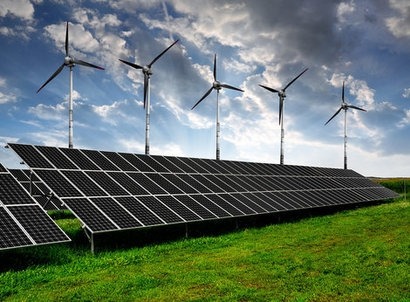
New analysis has found 374,900 hectares – representing 2.9 percent of land in England – that is ‘most suitable’ for new onshore wind and solar, with North Yorkshire, Lincolnshire and East Riding of Yorkshire being among the top areas with potential for new onshore wind and solar projects.
To demonstrate the country’s vast renewable power potential, researchers at Exeter University’s Environmental Intelligence Centre and Friends of the Earth identified 219,800 hectares of land considered most suitable for new onshore wind developments and 295,000 hectares with potential for new solar sites, some of which can be utilised for both – all while protecting nature and important landscapes.
Using a conservative approach that, among other factors, excluded national parks and areas of outstanding natural beauty (AONBs), higher grade agricultural land, small developments and heritage sites, the analysis still finds enough viable land to generate 130,421 GWh of solar power and 95,542 GWh of onshore wind. This is far in excess of current levels (17,063 GWh combined).
Estimates suggest that the UK must double the amount of renewable electricity it produces over the next six years to help power the green transition and replace energy phased out from fossil fuels. This electricity is needed to meet targets on electric vehicles and the switch to clean heating, as well as to hit the UK’s vital domestic climate targets and international commitment to cut carbon emissions by 68 percent by 2030.
The research finds that if all the land identified were developed for onshore solar or wind, 2.5 times more electricity than currently required to power all households in England could be produced. Given the UK also has huge offshore renewable resources and potential for other clean energy sources such as rooftop solar, not all the land identified would be required to help boost the country’s renewable energy output.
With a combination of viable clean energy sources, this means the UK could generate more than enough renewable energy to power a fair green transition to a zero-carbon economy and end its reliance on dirty, expensive and fossil fuels.
Furthermore, expanding onshore renewables would not only boost energy independence and end reliance on volatile global gas markets, the surplus power generated would also enable the UK to become a green energy superpower by exporting clean electricity to other countries.
“Unleashing the UK’s immense potential to generate cheap, clean homegrown renewables is essential to bring down our energy bills for good and meeting the UK’s vital international target to reduce carbon emissions by two thirds by 2030” said Tony Bosworth, climate campaigner at Friends of the Earth. “But the current government’s track record on boosting our energy security through renewables is woefully inadequate and has left the UK lagging far behind in the global race to a zero-carbon economy. Meanwhile, Labour is looking increasingly shaky on climate after rolling back its planned investment in green growth. We urgently need our political leaders to pull their heads out of the sand and produce a strong, ambitious and fair new climate plan that lifts the barriers to onshore wind and solar power and secures investment in the infrastructure needed to support the switch to renewables. These are win-win policies for creating long-term jobs, boosting our ailing economy and protecting our planet for future generations.”
Friends of the Earth is calling for:
All parties to commit to lifting the restrictions on onshore wind farms in England the run up to the next election.
Local authorities to identify ‘suitable areas’ for renewables in their Local Plan and/or Local Area Energy Plan.
Investment in an electricity grid that’s fit for the 21st century as a top infrastructure priority.
All renewable developments to deliver biodiversity benefits greater that the current statutory 10 percent minimum.
Communities to benefit and be properly engaged in plans for renewable projects in their areas.
From community-owned and run projects to energy companies ensuring residents benefit from reduced costs – a range of opportunities to involve people in local schemes, particularly the most marginalised, must all be part of the mix.
“Friends of the Earth’s welcome report is a good illustration of the wide suitability of land for solar development” added Gemma Grimes, Director of Policy and Delivery at the trade association Solar Energy UK, responding to the Friends of the Earth’s report. “If we assume that the same ratio of ground-mounted to roof-mounted developments that we see today continues – roughly 2:1 in terms of capacity – we would need about 35 GW of new solar farms to reach the Government’s goal of reaching 70 GW by 2035. That would mean that deployment would extend to a fraction of the area marked out in the study, while still offering lower bills, a more secure energy supply and benefits for wildlife.”
For additional information:

